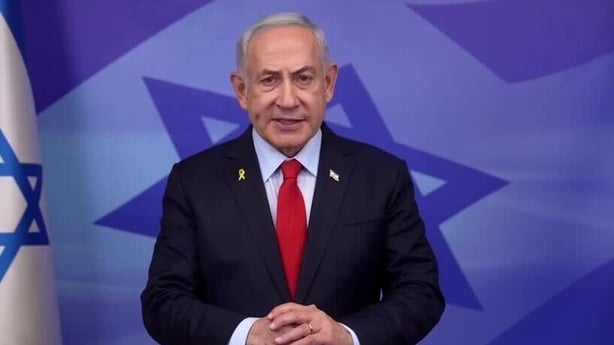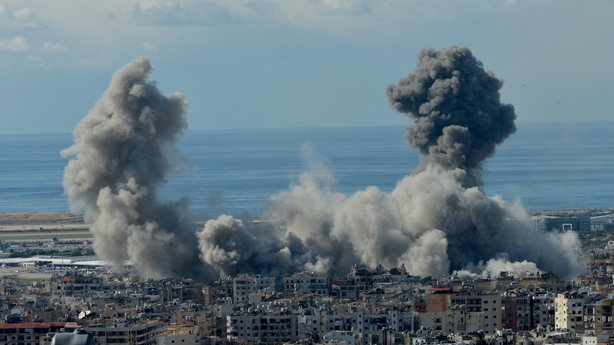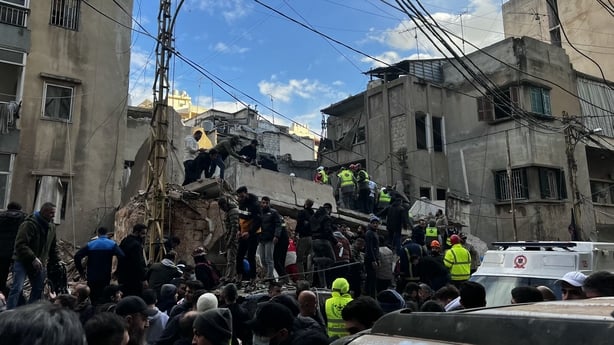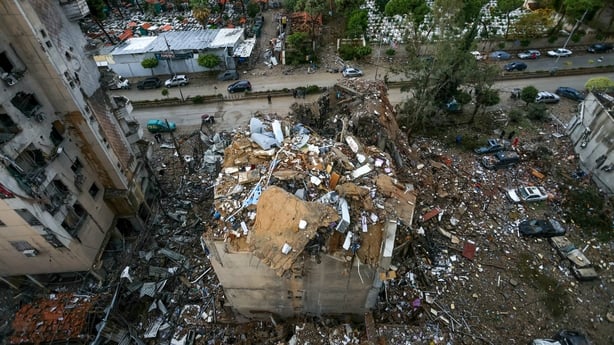A ceasefire between Israel and Hezbollah will take effect at 4am local time (2am Irish time) after both sides accepted an agreement brokered by the United States and France, US President Joe Biden said.
The agreement clears the way for an end to a conflict that has killed thousands of people since it was ignited by the Gaza war last year, was designed to be a permanent cessation of hostilities, Mr Biden said in remarks at the White House.
"This is designed to be a permanent cessation of hostilities," Mr Biden said.
"What is left of Hezbollah and other terrorist organisations will not be allowed to threaten the security of Israel again."
Israel will gradually withdraw its forces over a period of 60 days as Lebanon's army takes control of territory near its border with Israel to ensure that Hezbollah does not rebuild its infrastructure there, Mr Biden said.
"Civilians on both sides will soon be able to safely return to their communities," the US president added.
The Lebanon ceasefire agreement requires Israeli troops to withdraw from south Lebanon and Lebanon's army to deploy in the region, officials say. Hezbollah would also end its armed presence along the border south of the Litani River.
The US President also said his administration was pushing for an elusive ceasefire in Gaza and that it is possible that Saudi Arabia and Israel could normalise relations.
The US "will make another push, with Turkey, Egypt, Qatar, Israel and others, to achieve a ceasefire in Gaza," he said.
Mr Biden added that he wants the hostages released and to end the war without Hamas in power.
Lebanese Foreign Minister Abdallah Bou Habib said the Lebanese army would be ready to have at least 5,000 troops deployed in southern Lebanon as Israeli troops withdraw, and that the United States could play a role in rebuilding infrastructure destroyed by Israeli strikes.
The ceasefire deal for Lebanon will provide the conditions needed for a return to calm in the country, and France and the United States will both work to ensure the ceasefire is fully implemented, Mr Biden and French President Emmanuel Macron said in a joint statement.
A top UN official welcomed the ceasefire agreement between Israel and Hezbollah, but warned that "considerable work lies ahead" to implement the deal.
"Nothing less than the full and unwavering commitment of both parties is required," UN Special Coordinator for Lebanon, Jeanine Hennis-Plasschaert, said in a statement shortly after the agreement was announced.
The Tánaiste Micheál Martin welcomed the announcement of a ceasefire.
In a statement, Mr Martin said "both sides must use the ceasefire to engage meaningfully to achieve a durable peace".
The Tánaiste added that "a ceasefire in Lebanon highlights the urgent need for the violence in Gaza to stop."

Israeli Prime Minister Benjamin Netanyahu earlier said that he was ready to implement a ceasefire deal with Lebanon but would "respond forcefully to any violation" by Hezbollah.
In a televised address, Mr Netanyahu said that he would put the ceasefire accord to his full cabinet later this evening.
He warned that if Hezbollah were to break the deal, Israel "would strike at them".
"We will enforce the agreement and respond forcefully to any violation.
"Together, we will continue until victory," he added.
"In full coordination with the United States, we retain complete military freedom of action. Should Hezbollah violate the agreement or attempt to rearm, we will strike decisively," Mr Netanyahu added.
He gave three reasons for supporting a ceasefire.
It would allow Israel to focus on Iran, to replenish depleted arms supplies and give the army a rest, and finally to isolate Hamas, the militant group that triggered war in the region when it launched an attack on Israel from Gaza last year.
Mr Netanyahu insisted that Hezbollah, which is backed by Iran and allied to Hamas, was considerably weaker than it had been at the start of the conflict.

"We have set it back decades," he claimed, "eliminated... its top leaders, destroyed most of its rockets and missiles, neutralized thousands of fighters, and obliterated years of terror infrastructure near our border.
"We targeted strategic objectives across Lebanon, shaking Beirut to its core," he added.
Despite the diplomatic breakthrough, earlier hostilities raged as Israel dramatically ramped up its campaign of airstrikes in Beirut and other parts of Lebanon.

However, there was no indication that a truce in Lebanon would hasten a ceasefire and hostage-release deal in Gaza.
The Lebanon ceasefire agreement requires that Israeli troops withdraw from south Lebanon allowing Lebanon's army to deploy in the region, officials say.
Hezbollah would end its armed presence along the border with Israel south of the Litani River.
In the hours before the announcement, Israeli strikes smashed more of Beirut's densely-populated southern suburbs, a Hezbollah stronghold.

Israel issued its biggest evacuation warning yet, ordering civilians to leave 20 locations in Beruit ahead of a "widespread attack" on Hezbollah targets across the city.
Over the past year, more than 3,750 people have been killed in Lebanon and over one million have been forced from their homes, according to Lebanon's health ministry, which does not distinguish between civilians and combatants in its figures.
Hezbollah strikes have killed 45 civilians in northern Israel and the Israeli-occupied Golan Heights. At least 73 Israeli soldiers have been killed in northern Israel, the Golan Heights and in combat in southern Lebanon, according to Israeli authorities.
Read more:
Latest Middle East stories
Earlier, US Secretary of State Antony Blinken had said that efforts to secure the ceasefire in Lebanon were "in the final stages", and that a deal could help end the Gaza conflict.
Mr Blinken said that after months of "intensive diplomatic effort" with partners including France, working with Lebanon and Israel, he hoped to reach a conclusion "very soon".
"Hamas will know that it can't count on other fronts opening up in the war. So we're tracking this very closely, and I hope and believe that we can get this over the finish line," he added.
He was speaking at a meeting of the G-7 nations. Hosts Italy had invited ministers from several Arab nations to the talks, including from Saudi Arabia, Egypt, Jordan, the United Arab Emirates and Qatar.
The Middle East dominated the first day of the two-day meeting.

